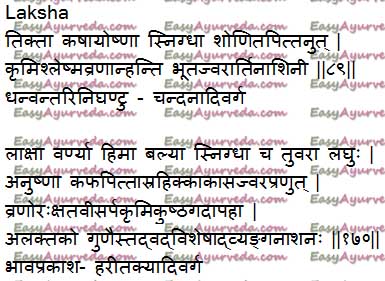Laksha – Laccifer lacca Benefits, Dose, Purification, Side Effects
By Dr Renita D’Souza Laksha (lac) is a reddish brown color resin secreted by the female lac insect ( Laccifer lacca). It is used in Ayurveda for bone fracture healing and to strengthen bones.
Table of Contents
Production
Lac production The lac insect feed on the sap of trees such as palasha (Butea monosperma), Ber (Zizyphus mauritiana), Babul (Acacia arabica), Khadira (Acacia catechu), peepal (Ficus religiosa) etc.
These insect secret the resinous secretion which is called as Lac. It is then crushed, sieved and washed to remove the impurities. The medicinal laksha is used after purification.
Processing, purification
Method of processing and purification:
Crude lac is collected, and plant parts adhering to it are remoed. It is melted in lamp flame and the molten lac is collected in a hot water vessel, kept below. In the vessel, waste products will float and pure lac sinks to the bottom of the vessel. It is collected, dried and used in the name of Laksha. Research – The research is conducted on processing crude lac to remove the impurities and to obtain the desired effect form lac as per description found in Unani system of medicine. Laksha (lac) procured from peepal tree is considered as the best when compared to that obtained from other tress.
Vernacular names
Vernacular Names of Lac
Hindi Name – laakh, laai
English Name – Lac, shellac
Kannada Name- aragu
Bengali Name – gaala, laaha
Punjabi Name – lac Tamil Name – araku
Qualities, health benefits
Medicinal Properties of Purified Lac
Rasa (taste) – Kashaya (astringent)
Veerya – Hima (cold)
Guna (qualities) – Laghu – light to digest, Snigdha – unctuous
Purified Laksha Health Benefits
Varnya – Improves skin complexion
Balya – Promotes strength Relieves burning sensation Due to its astringent property it is used in bleeding wounds and hastens the healing process.
Effect on Tridoshas Balances Kapha and Pitta Dosha
Laksha Indications
Raktapitta – Bleeding disorders such as nasal bleeding, heavy periods, ulerative colitis etc
Hikka – Hiccups
Kasa – Cough
Jwara – Fever
Vrana – Injuries, wounds
Urah Kshata – Chest injury
Visarpa – Herpes
Krimi – Worm infestation
Kusta – Skin diseases
Vyanga – The fluid lac dye called alaktha (alta or mahavar) which is obtained from lac possess all the qualities of lac is used to treat Vyanga (melasma).
Bhagna hita – Used to heal fractures Dental caries
Bhuta jwara nashini – fever due to psychiatric disorder.
Vishama jwara – recurrent fever Visha – Poisoning and toxic condition
Dose, Sanskrit verse
Dose of Laccifer lacca: 1- 3 grams
Adjuvant – Milk, Honey, Ghee

Composition, actions
Composition of Laksha
Resin, dye, wax, albuminous matter, mineral matter and water. Resinoltannols of aleuritic acid; erythrolaccin; lacconic acid.
Actions
Anti-inflammatory, Anti-arthritic, Anti-dysenteric, Haemostatic, Rejevenative, stomachic, Anti obesity, contaceptive, Hepatoprotective.
Side effects, distribution
Distribution
South-East Asian countries It Indian it is produced from Jharghand, Madya Pradesh, Bihar, West Bengal, Chattisgarh, Orrisa
Side Effects
There are no recorded side effects but it is better to be avoided by the women expecting to conceive due to its probable contraceptive action. Excess of its oral intake can irritate stomach. Hence it should be taken in prescribed dose along with adjuvants.
It should be checked from allergic reactions before its external application.
Interaction with medicines, supplements
Can this be used while taking Homeopathic medicine?
Yes. This product does not react with homeopathic medicine.
Can
this medicine be continued while taking supplements like multivitamin tablets,
Omega 3 fatty acids etc?
Yes. Generally, this product goes well with most
of the dietary supplements. However, if you are taking more than one product
per day, please consult your doctor for an opinion.
With western
medicines
Seek your
doctor’s advice if you are taking this product along with other western
(allopathic / modern) medicines. Some Ayurvedic herbs can interact with modern
medicine.
If both Ayurvedic and allopathic medicines are advised together, then it is
best to take Allopathic medicine first, wait for 30 minutes and then take the
Ayurvedic medicine.
Home remedies
Remedies with Kerria lacca
In menorrhagia laksha powder is taken with milk. Laksha powder along with honey can be applied in dental caries.
For strengthening bones and to accelerate fracture healing, Lac is administered along with guggulu, Triphala and milk.
Research – A research conducted on healing effect of laksha powder mixed with honey have concluded it as the effective treatment for tartar without any oral medications.
Ayurvedic medicines
Ayurvedic Medicines Containing Laksha
Lakshadi Guggulu – It is the best Ayurvedic tablet form medicine used in fracture healing and other bone related diseases.
Lakshadi Oil – It is used for external application in bodyache. Used to relieve muscle and joint pain.
Chandanabala Lakshadi Taila – It is used to relieve burning sensation, blisters, itching, headache, fatigue, bleeding disorders etc. It is used both externally and for oral intake.
Categorization
Kerria lacca
Scale insect
Class — Insecta
Order — Hemiptera
Family — Lacciferidae
Species — lacca Latin
synonym: Kerria lacca
Sanskrit synonyms
Laksha, Palankasha Alaktha, Yaava, Vrekshaamaya, jatu
Classical Categorisation of Laksa
Dhanvantari Nighantu – Chandanadi varga
Bhavaprakasha – Harithkyadi varga
Raja Nighantu – Pippalyadi varga
Shodala varga – Chandanadi varga
Kaiyadeva Nighantu – Aushadi varga
Click to Consult Dr Renita D’Souza










